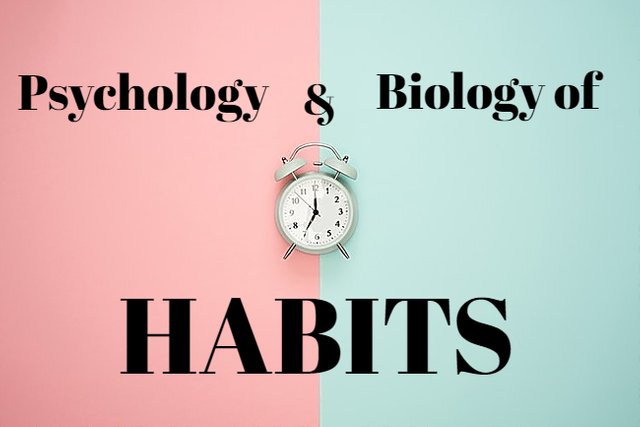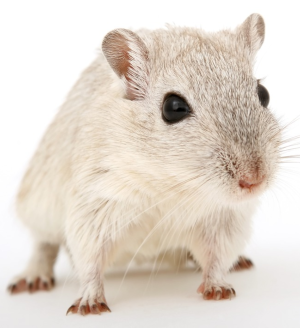Have you ever heard about that old myth how you have to repeat an action 21 times before it becomes a habit? The thing is, it is just that, a myth that can be interesting to read about but do not freak out when you realize that it holds no real scientific value or actual truth. Today, I will explain to you how habits form and what areas in your brain are involved in that process. There is a huge difference between habits and choices. Knowing about that difference does have its benefits. From biology to psychology, we will cover all that you need to know and do in order to create new habits. Breaking them? Also a myth. There is no such thing as breaking a habit. Replacing it? Now you are on to something...

CC0 image, Unsplash, author: Icons8 team, adapted by me
From wanting to eat healthy food, exercising, and quitting smoking to changing how we react to people and various surrounding stimuli, we all have some desires about what we want or do not want as our habits. Most of the motivational philosophies out there tell us how taking that first step, although the most difficult, presents the most important part in creating something new. I do not want to burst your happy bubble, but that second, third, and twenty-seventh step in the process are actually far more important and can be more difficult. Sure, taking the first step is hard but not as hard as taking the second one. A lot of people try a lot of things all the time but not all of them stick to them. Why? Lack of determination, will-power, and confidence. All of those 3 things are not magical, in fact, they are almost tangible and have everything to do with your brain synapses.


Every habit starts with a psychological pattern called a "habit loop" that has 3 parts. The first one is the trigger that tells the brain to go into automatic mode. The second one is the behavior itself and the third one is the reward, something that the brain likes. It helps it to remember the "habit loop" in the future. While we are making decisions, the prefrontal cortex is in charge but as soon as the habitual behavior starts, the basal ganglia (also connected to the development of emotions, memories and pattern recognition) "fires up" and turns the behavior into an automatic routine. You do not even have to be mentally aware of it.
The autopilot mode...
An "autopilot" is our ability to respond quickly and efficiently to the environment without having to activate higher centers in the brain. You sometimes do not remember how you drove home or tied your shoes because you were not paying active attention and yet, performed the task with no problem. The default mode network (DMN) is vital for the autopilot function. Now, even though it may seem how habitual action is simple and effortless, it involves a string of small necessary movements. That complex set of movements that come together to form one routine action that is performed unconsciously is called "chunking." You can read a research about chunking here:
How should we measure chunks? a continuing issue in chunking research and a way forward by Amanda L. Gilchrist
There has been a new study on mice that showed how the striatum, a region of the brain previously associated with decision-making, also plays an important role in acquiring habits. The patterns of signals transmitted between neurons in the striatum shifted as the animals were taught a new sequence of actions which evolved into a habit. At the beginning of the learning process, the neurons emitted a continuous string of signals but as the mice's actions started to consolidate into habitual movements, the neurons fired their distinctive signals only at the beginning and at the end of the task performed. To study this even further, they set out to teach rats to press two levers repeatedly in a specific order and used reward conditioning to motivate the animals. The animals had to press the levers in the correct sequence to get chocolate milk. Once the animals had learned to press the levers in the sequence previously established, the team noticed the same "bookending" pattern in the striatum. Sets of neurons would fire signals at the beginning and end of a task.
"It really is a high-level signal that helps to release that habit, and we think the end signal says the routine has been done."
-Ann Graybiel (an Institute Professor at MIT, a member of the McGovern Institute for Brain Research, and the senior author of the study)
The team also noted the formation of another pattern of activity in a group of inhibitory brain cells called "interneurons" in the striatum. Those cells were activated when the rats were in the middle of performing the learned sequence which could mean that their activation is preventing the principal neurons from initiating another routine until the current one finishes. For more info about these researches, check out these links:
Inversely Active Striatal Projection Neurons and Interneurons Selectively Delimit Useful Behavioral Sequences by Nuné Martiros, Alexandra A. Burgess, Ann M. Graybiel
Habit formation coincides with shifts in reinforcement representations in the sensorimotor striatum. by Smith KS, Graybiel AM
The Role of the Dorsal Striatum in Reward and Decision-Making by Bernard W. Balleine, Mauricio R. Delgado and Okihide Hikosaka


That popular myth, about how you need 21 days of repeating an action until it becomes a habit, is from the 1960s. A plastic surgeon, Maxwell Maltz, found that it would take the patient about 21 days to get used to seeing their new face or stop feeling phantom pain after amputation. He wrote a book, called Psycho-Cybernetics, about behavior change in which he said: "These, and many other commonly observed phenomena tend to show that it requires a minimum of about 21 days for an old mental image to dissolve and a new one to jell.". The problem is that word minimum that people forget to mention when they speak about this. Unfortunately, some people even say it is a statistical fact. Do you remember me explaining what emotional reasoning is in one of my previous posts? How if enough people say the thing enough times, everyone else starts to believe it? Be aware of that and fact check your sources always. 21 days is not enough for everyone, not even for most people so do not rely on that number.
66 days are needed, ON AVERAGE...
A study, published in the European Journal of Social Psychology, examined the habits of 96 people over a 12-week period. Every person chose one new habit from simple ones like drinking water with lunch to more difficult ones like running for 15 minutes every day. Researchers analyzed the data to determine how long it took each person to go from starting a new behavior to automatically doing it. It took anywhere from 18 days to 254 days for people to form a new habit with an average being 66 days. The conclusion was that it depends on the behavior, the person, and the circumstances so if you want to be realistic, consider the time frame of somewhere between two and eight months to form a new habit. I know 21 days sounds more encouraging and who would not want to change his life in only 3 weeks but if you want to be completely realistic: you are changing your life every day, with every decision you are sticking to. You can read the full study here:
How are habits formed: Modelling habit formation in the real world by Phillippa Lally, Cornelia H. M. van Jaarsveld, Henry W. W. Potts, Jane Wardle
There is a special silver lining to this research. Not only can you develop a new habit in less than 21 days but habit formation is not an all-or-nothing process. The researchers found that missing one opportunity to perform the behavior did not affect the habit formation process so do not be too hard on yourself when you mess up now and then. Just be determined and stick to your decision. It really does not matter if you need to perform a certain task 100 or 1000 times, you still have to do it. You will have better days and worse days but trust yourself that you are the only one that decides to quit or push on.


To break a habit is equally as hard as developing it because those things are very connected. In most cases, for one habit to break, another has to take its place. Habit forming and habit breaking can be quite closely linked.
"Breaking a habit really means establishing a new habit, a new pre-potent response. The old habit or pattern of responding is still there (a pattern of neuron responses in the brain), but it is less dominant (less potent)."
-psychologist Timothy Pychyl
Experts mostly agree that there is no typical time frame for breaking a habit. It depends on the personality, motivation, circumstances, and the habit in question and neuroscience agrees with psychology how replacement therapy will give better results than simply quitting.
It's much easier to start doing something new than to stop doing something habitual without a replacement behavior"
-neuroscientist Elliot Berkman
To read more about what happens in the brain and how are habits formed, I suggest you read these:
Goals and Habits in the Brain by Ray J. Dolan, and Peter Dayan
How are habits formed: Modelling habit formation in the real world by Phillippa Lally, Cornelia H. M. Van Jaarsveld, Henry W. W. Potts and Jane Wardle
Making health habitual: the psychology of ‘habit-formation’ and general practice by Benjamin Gardner
Want to break a habit?
Replace it with another one.
Depending on the habit you want to get rid of, your brain may be more or less impacted by it. Some things like addictions to cigarettes or drugs impact the brain chemical state more than simple behavioral habits like reading newspaper in the morning. The first thing you obviously need is a strong motivation for change. Replacement behavior will help you but make sure that the replacing habit is a positive one. Many people substitute smoking with eating which is never good, find a positive habit instead. You should know that the longer you have had a habit, the longer it will take you to get rid of it. Your neural pathways are determining your behavior so you will have to be extra concentrated and focused so you do not slip into old habit without even realizing. You can change, you just need to want it and be determined.
Quiting a habit and developing a habit is very similar and no matter which one of those you want, keep in mind that procrastination is your biggest enemy here. Strong will and determination are your allies. Stay realistic and instead of setting yourself up with one huge unrealistic goal, start with many smaller ones that will be easier to achieve. You will gain self-confidence that way and make your chances of succeeding bigger. Trust in yourself. You can do it, you just have to convince yourself that you can. I know, not an easy task but doable never the less. I never said it was easy now did I?


You can train your brain to act as you want. You just need to make it and force it. The funny thing is, you are controlling your brain with your brain. I know, hilarious but true. Think of it as training a puppy, the more effort you put into the process the better those results will be. Repeating a certain action over and over again will create a habit out of it. Do not trouble yourself with numbers and if it will take you 7, 21, 66 or 999 days to create a new habit but enjoy the process instead. Take care of your body and mind and you will see results sooner than you expect. You can do it so do not give up. Notice improvements and be satisfied with each step on that journey. I wish you all the best!
To read more about this topic, check out these REFERENCES:
What happens in the brain when habits form? from medicalnewstoday.com
Habits: How They Form And How To Break Them from npr.org
Distinctive brain pattern helps habits form from mit.edu
How Long Does it Actually Take to Form a New Habit? from jamesclear.com
Here's How Long It Really Takes to Break a Habit, According to Science from sciencealert.com

Until next time,
KEEP YOUR SMILE ON!



Image sources AND LICENCES in order of appearance:
- all images used in this post are free for commercial use, they are royalty free with the links to original images provided under them
- titles are made with the CC0 image from Pixabay that can be found here
- line divider that I use is from FREE CLIPART LIBRARY, and is here
- my bitmoji avatar was created on https://www.bitmoji.com/, visit the site to create yourown
PROUD MEMBER OF:


@steemitbloggers























What a wonderful post, you really are amazingly wise @zen-art! We can indeed retrain our brain just takes hard work, repetition and perseverance not so! Thank you!
Yes we can, we just need to be persistent and determined 💚
This story was recommended by Steeve to its users and upvoted by one or more of them.
Check @steeveapp to learn more about Steeve, an AI-powered Steem interface.
Thanks Steeve :)
I have been trying hard to form this habit of waking up early and it just doesn't get throygh. I would do it for few days and then the evil weekend comes and spoils it.....hehe, then I think it's ok why do I need to get up early and it all goes back to zero.
Its a wonderful and insightful read. I thought 40 days is the average period to develop a habit.
Once you will want it, you will do it. If you do not see it as important, of course there is no motivation and that is ok. The point is to enjoy yourself and everything you do, not all people should get up early ;)
Congratulations @zen-art! You have completed the following achievement on the Steem blockchain and have been rewarded with new badge(s) :
Click here to view your Board of Honor
If you no longer want to receive notifications, reply to this comment with the word
STOPCongratulations! Your post has been selected as a daily Steemit truffle! It is listed on rank 14 of all contributions awarded today. You can find the TOP DAILY TRUFFLE PICKS HERE.
I upvoted your contribution because to my mind your post is at least 5 SBD worth and should receive 168 votes. It's now up to the lovely Steemit community to make this come true.
I am
TrufflePig, an Artificial Intelligence Bot that helps minnows and content curators using Machine Learning. If you are curious how I select content, you can find an explanation here!Have a nice day and sincerely yours,

TrufflePigThanks for this great post. This is just what I needed I've been trying to train my brain with my brain to create some new habits now to replace some unproductive ones. I've read about the 21 days to form a habit article but I guess it did not work out for me or maybe I didn't really stick to it. Right now, I'm trying to beat procrastination as it has been my greatest challenge in forming new habits.
Procrastination kills more dreams than doubt ever will and the only way to overcome it is to do stuff the moment they come to our mind with no prolonging them. Good luck! 💚
Thank you very much
Posted using Partiko Android
So much Yessss to it all @zen-art <333 :)
Here is my favorite bit though...
Thank you BeautyFull! Shared forward ;)
I am glad you approve! Much love 💚💚💚
This post was shared in the Curation Collective Discord community for curators, and upvoted and resteemed by the @c-squared community account after manual review.
@c-squared runs a community witness. Please consider using one of your witness votes on us here
Thank you 💚💚💚
I didn't realize the benefit of replacing a habit rather than trying to break it. That is something that I will keep in mind when I'm trying to get my kids out of the habit of leaving messes everywhere around the house!
Hihihi, try creating a habit of cleaning and putting stuff in their place :) Good luck!
I remember when I quit smoking I took up munching on carrots instead, I used to go out with baby carrots in my pocket, I was quiet the sight really, but it really worked. Thank you for sharing more of your wonderful wisdom with us all xxx
It was a good replacement with those carrots, and a healthy one too, kudos! 💚